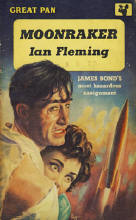|
Click below for books beginning with:

Numbered Books
G-series
G200
G500
H
- W series
X-series
X200
X400
5-digit
02300
02600
10200
20100
23700
24700
|
|
One
of the great paperback labels in the United Kingdom, Pan began
operation in London in 1944. Unlike Penguin, they relied on colorful cover
art to help sell their works, and thus became a favorite among collectors.
Pan attracted a great number of
popular authors of the day, but they are particularly notable for two,
selling paperback originals of Leslie Charteris' The Saint novels
and the original James Bond books by Ian Fleming. Much later,
they would produce the famous Hitchhiker books by Douglas Adams.
After WWII, the company was purchased
by a consortium that included Collins, Heinemann, Hodder & Stoughton, and
others; but in 1987, they became wholly owned by Macmillan. They continue
to publish many of today's favorite authors.
Notes and observations
by Grant Thiessen:
You can find more than you ever wished to know about Pan at
https://www.tikit.net/
Pan published the following series:
- No letter 1-443 1947-1958
- E 1-22
- G 1-717 1947-1966 the first 100 numbers, plus 102, used GP before the
number, 101 and 103-717 was just G. This is one sequence
there is one exception. The first book was released as G1, then reprinted
as GP1 the next year.
- H 1-3
- M 1-274 1959-1968
- R 1
- T 1-53 1963-1966
- W 1
- X 1-745 1956-1968
- Z 1-2
XP 1-155 (Pan Piper) (could have a variety of different first letters (M,
X, E, T, W or Z), based on price, but the second letter was always P
should be sorted by the number. Later, Pan Piper’s were part of the same
5-digit numbering system as other Pan’s, with the Piper distinction on
some reprints, but not others, and even added to titles not previously
identified as Pipers.
5-digit Pan numbers starting with 01 are reprints of books in the G
series, by putting 01 in front of the 3-digits from the G series (see
below for why 01638 and 01962 are incorrect). numbers starting with 10 are
reprints of the books in the X series, by putting 10 in front of the three
digit number of the associated X-series book. Books starting with 13 and
23 are all reprints from the Pan Piper series, starting with 13 or 23 and
then using the 3 digit piper number. Books starting with 20, are reprints
of the corresponding M series books.
Beginning in 1968, Pan did what seems like an unbroken sequence from 02000
to 02999, then sometime in 1972 they jumped to 23161, and at the same time
discontinued the 10xxx’s and 20xxx’s reprints (after that date, reprints
were assigned a new, unrelated number), and carried on from there,
finishing the 1970’s around 25900. There are reprints with the 10xxx or
20xxx numbers after 1972, but all of those titles had already had an
earlier reprint with that book number between 1968 and 1972.
Identification by date is possible to a degree by looking at the Pan
identification, and shows that not all Pan books were published in strict
numerical order, so book numbers must have been assigned at time to
contract, most likely.
1968-1970: traditional older Pan logo, with ‘PAN” in a colored box beside
the satyr, upper right corner, lower case ‘books” below “PAN”
there are a few exceptions, like some of the Pan Romances, which have a
satyr at each side of “A Pan Romance” also through this, and the next
group, was the “Pan Science Fiction” with the thick bisecting horizontal
bottom of the “S”
1970-1971: lower case “pan books”, moved to left upper
corner, beside logo
1971-1972: title case, often bold ‘Pan Books’, beside
the logo
1972-79: ‘Pan’ beside or below the logo; new books starting in
1973 tended to have the ‘Pan’ below the logo, some reprints had it beside.
Use of these styles outside of the date ranges are usually where the cover
was unchanged from an earlier edition which DID fall in those date ranges.
There are also a number of exceptions where the actual word Pan did not
appear on the cover at all, just the satyr.
Pan/Ballantine reprints of Ballantine books for the British market, used
Ballantine’s ISBN of 0-345, instead of Pan’s 0-330
Lettered Pan tended to put a price on the cover. Covers without that price
were usually export printings, so many of my scans do not have that price.
Printing history pages are identical. Most 5-digit Pan’s had prices only
on the back cover.
The most valuable of the Pan’s is the first export printing of Ian
Fleming’s On Her Majesty’s Secret Service. (X350) The first three
printings were all exported to Canada (and possibly Australia). The first
printing released in England was the fourth printing, making the first
printing much in demand, especially as it had a relatively low print run.
Even a poor copy of this printing will sell for $300 or more
Pan used a printer in France at the beginning for the first 100 or so
titles, due to paper shortages. They reverted to printing them in England
in 1950. any reference in the first 100 or so, referring to France, are
not unusual, they are the normal.
There are two different books numbered GP29. One of them should probably
have been GP31, which otherwise does not exist.
Previous Home Database
Index
"Non-US" Index
Next
Back to
Update 45
|
